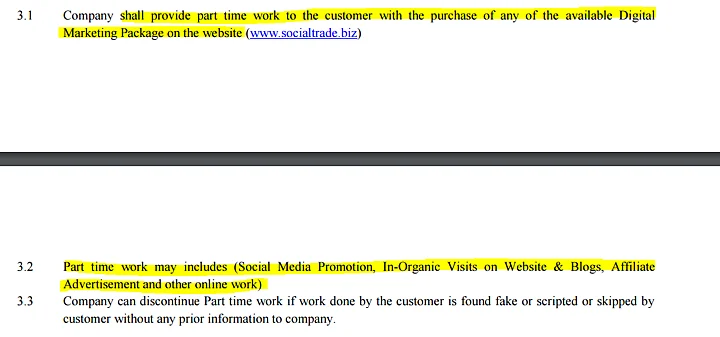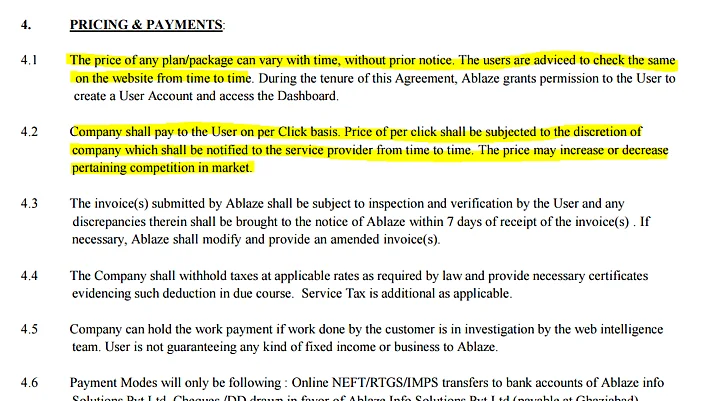Social Trade, a 'digital marketing' web portal, has been making headlines ever since its founder, 26-year-old Anubhav Mittal, was arrested for a Rs 3700-crore ‘cash-for-likes’ scam.
But is it a Ponzi scam? The Quint analyses its business model and looks at the company’s Service Agreement to try and answer that.
The Maths Behind the ‘Cash-for-Click’ Scheme
Social Trade offered four packages to its users; selling likes and giving ‘part-time work’ in return, which meant clicking on links for Rs 5 per link. The highest package cost Rs 57,250 for 6,000 likes (or ‘e-points’) with 125 links being given to users to click on every day.
In January 2017, Social Trade modified its prices, and it then cost Rs 57,500 for 5,000 likes, with 100 links being given to users.
Let’s assume I am a Social Trade user and I buy this package. Here’s the maths of how much I would earn in a year using this package:
Total number of working days in a year: 250
(after deducting Saturdays, Sundays and public holidays)
Assuming 240 days (to account for other contingencies), money earned in a year would be:
240 days x 100 likes x Rs 5 = Rs. 1,20,000
According to a Social Trade user, 20-25% was deducted from the final amount as admin charges and TDS.
So, assuming the upper limit of 25%, the final amount received would be: Rs 90,000
This means that I’m getting a higher return on my investment and clicking on 24,000 links a year for 5,000 likes. For the owner of Social Trade, it is essentially a loss-making business; which looks like a classic Ponzi scam.
More importantly, if I get two other users to join the website, then I am given a ‘booster’; wherein the number of links given each day doubles.
What Is a Ponzi Scam? And How Does Social Trade Compare?
According to Ed Ketz, an associate professor of accounting at Penn State, victims of a Ponzi scam are ‘lured by the promise of fantastic returns on their money.’ He explains that in a Ponzi scheme, money from one investor is given to another investor; it’s a system premised on circulation of money. He says:
It’s a charade to get new investments to feed the previous investors and further enrich the person carrying out the scam.
But a Ponzi scam will collapse.
At some point, there will be no new investors. So, while old investors will earn the promised high returns, the newest investors who just joined the scheme will lose.
And according to the police, Anubhav Mittal’s Social Trade was a Ponzi scheme teetering on collapse.
In an interview to Hindustan Times, Amit Pathak, senior superintendent of police, UP Special Task force said:
Ablaze Info Solutions Private Limited run by Anubhav Mittal was not doing any business or earning any profit from investments. The model that it was following was fraudulent because it was only circulating investors’ money. First, Mittal was paying daily to investors, later he started paying weekly. He had plans to leave the country to escape the law.
In fact, The Quint spoke to six Social Trade users and they stated that there was a delay in payment, with the longest non-payment period being 45 days. As has been widely reported, Social Trade owner Anubhav Mittal was arrested for non-payment, after two complaints were registered at Noida’s Surajpur and Phase-3 police stations.
Pawan Duggal, an advocate specialising in cyber law, says,
Any scheme which ultimately doesn’t have a sustainable business model is considered to be a Ponzi scam and Social Trade has no sustainable model. There are no contracts between Social Trade and any other company. Money was being taken from ABC and being given to XYZ. I think it was a Ponzi scheme wherein the police came in before it went bust.Pawan Duggal, Advocate
Examining Social Trade’s Terms of Agreement
Do Social Trade’s terms and conditions specifically state that a higher return would be provided on an investment, making it a classic Ponzi scam?
Not really. Instead of an investment-and-return agreement, Social Trade’s terms and conditions is structured like a service agreement, making it difficult to pinpoint legal liability.
The Quint has accessed Social Trade’s ‘Service Agreement’, and the agreement specifies ‘part-time work’ and mentions that ‘Company shall pay to the User on Per Click basis.’ Here are some notable excerpts:
- 01/02Screenshot of the Service Agreement. (Photo: The Quint)
- 02/02Screenshot of the Service Agreement. (Photo: The Quint)
By itself, the service agreement does not provide enough evidence of being a Ponzi scheme. Upon analysis, it appears that Social Trade is deliberately vague and silent on its schemes, which makes determining whether it’s legally a Ponzi scheme an interpretative exercise. However, the maths behind the business model, anecdotes by investors and evidence collected by investigators point to a different truth.
Notably, the agreement does not mention boosters; an essential part of the pyramid structure of Social Trade.
Social Trade looks like a Ponzi, mathematically proves itself to be a Ponzi and indeed, is being investigated as one. But its form differs, in that legally, it is structured like a service agreement. As far as the final verdict is concerned, one will inevitably have to wait for the outcome of the police’s investigation.
(At The Quint, we question everything. Play an active role in shaping our journalism by becoming a member today.)


